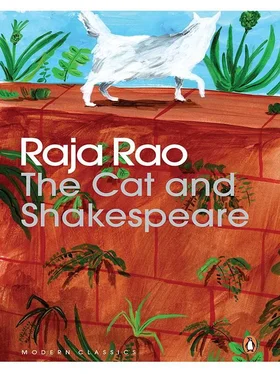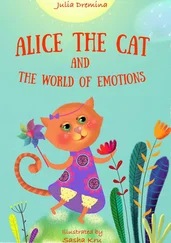Rao Raja - The Cat and Shakespeare
Здесь есть возможность читать онлайн «Rao Raja - The Cat and Shakespeare» весь текст электронной книги совершенно бесплатно (целиком полную версию без сокращений). В некоторых случаях можно слушать аудио, скачать через торрент в формате fb2 и присутствует краткое содержание. Год выпуска: 2014, Издательство: Penguin, Жанр: Современная проза, на английском языке. Описание произведения, (предисловие) а так же отзывы посетителей доступны на портале библиотеки ЛибКат.
- Название:The Cat and Shakespeare
- Автор:
- Издательство:Penguin
- Жанр:
- Год:2014
- ISBN:нет данных
- Рейтинг книги:4 / 5. Голосов: 1
-
Избранное:Добавить в избранное
- Отзывы:
-
Ваша оценка:
- 80
- 1
- 2
- 3
- 4
- 5
The Cat and Shakespeare: краткое содержание, описание и аннотация
Предлагаем к чтению аннотацию, описание, краткое содержание или предисловие (зависит от того, что написал сам автор книги «The Cat and Shakespeare»). Если вы не нашли необходимую информацию о книге — напишите в комментариях, мы постараемся отыскать её.
The Cat and Shakespeare — читать онлайн бесплатно полную книгу (весь текст) целиком
Ниже представлен текст книги, разбитый по страницам. Система сохранения места последней прочитанной страницы, позволяет с удобством читать онлайн бесплатно книгу «The Cat and Shakespeare», без необходимости каждый раз заново искать на чём Вы остановились. Поставьте закладку, и сможете в любой момент перейти на страницу, на которой закончили чтение.
Интервал:
Закладка:
Girls were obviously gathered at the back of the big room opposite. ‘This is Shiv Shanker Pillai,’ muttered Velayudhan Nair, introducing a sleek middle-aged man with an ochre shirt, a clean white elegant dhoti, gold-rimmed glasses — and to speak truly, a gentle, sweet-looking man. ‘He is in charge of the clinic,’ said Velayudhan Nair, and started smiling as if to himself.
‘If the patient could come in and choose his doctor, it would be nice. Like they say in America they have different doctors for different diseases, we have different cures for different horoscopes as it were, and diagnosed by experts. But let us go in.’
Shiv Shanker Pillai opened a big door and Govindan Nair walked in. A large bed lay between the corner and the window to the right. There was also an office table and a chair. A gentle light fell on everything. Even pencil and paper were laid out on the table as if on purpose. ‘We write love letters here,’ Shiv Shanker Pillai joked. A girl came in from behind them, round, with nose ring and necklace, with black hair and a rich bosom. She was shy. ‘The patient may undress while the doctor is getting ready,’ said Shiv Shanker Pillai, and went out. He seemed serious in saying this.
The rich bosom heaved. The choli came open. The girl started cooing and singing. She danced a mellow dance. Govindan Nair sat on the chair and looked at this with fascination. ‘What a beautiful woman you are,’ he said. ‘Beauty is the core of music.’ And she continued to dance. Govindan Nair did not get up. He drew the chair nearer as if to see more clearly. He said again and again, ‘You are beautiful, I can see.’ Then she stripped herself and lay on the bed. The gold necklace fell so curvedly about her breast. Her shape was comely, a little fat above the down of the belly. She had much pubic hair, he observed. So she did not shave those parts.
‘How many children do you have?’ asked Govindan Nair.
‘Two,’ said the girl, and added after a long pause: ‘My name is Lakshmi. Oh, my name is Lakshmi,’ she repeated, as if this would explain unsayable things.
‘Two — it means sixty-four ounces,’ he said, to prove he had understood.
‘What’s that?’ she asked, playful, hoping he would come and caress her.
‘It’s just the worth of man plus man — at the ration shop.’
‘Why do you work there?’ she asked, sitting up. Her breasts drooped a little but were very rapt and succouring, beautiful. Govindan Nair had once wanted to paint.
‘Why don’t you work in one? We all live on rations,’ he said, smiling. ‘What is your salary?’ he asked.
‘Six rupees a day plus tips. Good men are good. Sometimes they even give me a necklace. Look at this one. A Seth from the north gave it to me. (He was a grain merchant.) I did not understand his language. He did not speak mine. But he came back after he had gone, and gave it to me and said: Be happy.’
‘Are you happy?’ asked Govindan Nair.
The girl threw a bit of her sari over her body.
‘Are you?’ she asked.
‘Can’t you see I am happy?’
‘Where does it come from?’
‘Where does water come from?’
‘From the tap?’
‘And the water in the tap?’
‘From the lake?’
‘And the water in the lake?’
‘From the sky.’
‘And the water in the sky?’
‘From the ocean?’
‘And the water in the ocean?’
‘From the rivers.’
‘And the river waters?’
‘They make the lakes.’
‘And the tap water?’
‘Is river water.’
‘And so?’
‘Water comes from water,’ she said.
‘I am a kitten,’ he said.
She seemed frightened. She covered her pubic parts with her sari.
‘What?’ she asked.
‘I let the mother cat carry me.’
‘And so?’
‘And the river flows.’
‘And then?’
‘The lakes give water to taps.’
‘Then?’
‘Man is happy — because he knows he lives in a house three storeys high. When his woman is going to have a child, he will build a house two storeys high. He will marry her and build his child a house. The child, the child, he cries as if in tragic tenderness, the child will have a house to grow in. Oh, children need houses. And women need husbands.’
‘I had a husband,’ she said. ‘Yes,’ she insisted.
‘What happened to him?’
‘He died in the wars.’
‘Who killed him?’
‘The British.’ ‘Why?’
‘Because he would not shoot at the Germans.’
‘And how did you come here?’ he asked.
‘And how did you come here?’ she replied.
‘I came because I work in a ration office. I distribute physical happiness to him that wants.’
‘And not to her that wants?’
‘I have a she — and she wants it, and I pour it into her. To speak the truth, nobody can give. Only the mother cat can give.’
‘Give me!’ she cried.
‘Come tomorrow to Ration Office No. 66. I will give you a card, a family card. Between ten and five we are always there.’
She sank back on the bed. Govindan Nair observed that she had flowers in her hair. She was gazing at the ceiling. Just a tear or two was dropping, marking her face with collyrium. She looked lovely with her well-knit limbs, her sorrow which heaved her breasts — there was such ovular pain where the centre of her body lay. He put his hand there and said, ‘Forgive.’
His touch seemed magical. She flung up and put her arms around him, her breasts against his face. He bowed low, made a namaskar, and stood up. How can man make a woman suffer? How can anyone touch a body so smooth, a face so gentle, so helpless, the Seth’s necklace speaking a strange tongue against her imbibing navel? Her hair was so perfect.
‘The British did it?’ he said.
‘Yes. Man did it,’ she said.
‘May I go? he asked.
‘Yes,’ she said, like a wife to a husband. Tenderly she rose, covered herself, and stood up like a daughter before a father. He turned as if to hide his emotions. Of course pen and paper were there. Everything was typed and ready. He signed the paper. Ration Shop Licence No. 9181 in the District of Ummathur. In the village of Udasekarapuram. Name of the holder: Prabhakar Pillai. Address: Main Street, Murtarakara. Valid up to August 11, 1944. Signed: B. Govindan Nair. The signature was clear and round as the eyes of a child. Lakshmi was dressed by now. She looked so clean, so like a Brahmin lady near the temple streets.
‘Your husband will come back,’ he said.
‘They shot him,’ she said.
‘No, they did not. I have the ration cards of all the soldiers. I have his name, I am sure, in the office. Our working hours are between ten and five.’
‘Bless me, as if I were your daughter,’ she said.
‘My sister,’ he said.
And when she lifted up her face, her whole being was lucent. She was going to find her husband. Life is like that. You get what you want. But do you know what you want? ‘Do you really know? Mister, that is the problem,’ said Govindan Nair that evening to me. ‘You do not want to build this house. I really want to. Shantha will have a child. She is your wife. A wife must have a house. You have a son. I prophesy,’ he said, and jumped across the wall as if carried away like a kitten.
I want to take you to London, will you come? I want to take you to Paris, Delhi, New York, will you come? Will you truly come? Don’t you hear the koel sing on the coconut tree, don’t you hear the anguish that wants to eat your heart, cut it and pickle it, and savour it, and say: Look what a good heart I have. I am a woman. And I have such a good heart. What will you give me in return, my lord? I should give you, woman, a house three-storeys high. Lord, may that rise. And do not forget the windows that go running along the wall towards the sea. I must have eleven windows on the sea. A window on the sea is a window on God. Buy me a plot and build me a house eight directions wide, and that will have a tamarind tree in the backyard for the baby’s hammock, a row of dahlias (like Europeans have) in a bed to the right, and a mango tree that will stretch and burden itself with such riches that, when the koel sings, we know its song will make the fruit ripen. For the woman with a womb that has grown round, what one needs is ripe, rich rasapuri mangoes. Cut them, peel the skins off and, Mother, give them to me on a silver plate. And one cup of milk immediately after.
Читать дальшеИнтервал:
Закладка:
Похожие книги на «The Cat and Shakespeare»
Представляем Вашему вниманию похожие книги на «The Cat and Shakespeare» списком для выбора. Мы отобрали схожую по названию и смыслу литературу в надежде предоставить читателям больше вариантов отыскать новые, интересные, ещё непрочитанные произведения.
Обсуждение, отзывы о книге «The Cat and Shakespeare» и просто собственные мнения читателей. Оставьте ваши комментарии, напишите, что Вы думаете о произведении, его смысле или главных героях. Укажите что конкретно понравилось, а что нет, и почему Вы так считаете.












